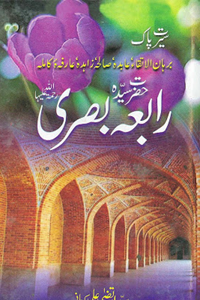
| Book Name | Hazrat Syeda Rabia Basri R.A |
| Author | Syed Irtiza Ali Karmani |
| Publish Year | 2001 |
| Publisher | Azim and Sons Publishers, Lahore |
| Language | Urdu |
| Genre | Islamic History |
| ISBN | NA |
| Download | Link1 |
Review: Hazrat Rabia Basri
This Book Hazrat Syeda Rabia Basri R.A is written by Syed Irtiza Ali Karmani is a complete life story or Biography of Hazrat Rabia Basri. Hazrat Bibi Rabia Basri was a Muslim saint and Sufi mystic. She is known in some parts of the world as, Hazrat Bibi Rabia Basri, Rabia Al Basri or simply Rabia Basri.Said to have been born between 714 and 718 CE (95 and 98 Hijri) in Basra, Iraq of the Qays tribe. much of Rabiʻas early life has been recounted by Farid ud-Din Attar, a later Sufi saint and poet.
She herself left no written works about her life. She was the fourth daughter of her family and therefore named Rābiʻa, meaning "fourth".
According to Fariduddin Attar, when Rabiʻa was born, her parents were so poor that there was no oil in house to light a lamp, nor even a cloth to wrap her with. Her mother asked her husband to borrow some oil from a neighbor, but he had resolved in his life never to ask for anything from anyone except God. He pretended to go to the neighbor's door and returned home empty-handed. At night Muhammad appeared to him in a dream and told him,
"Your newly born daughter is a favorite of the Lord, and shall lead many Muslims to the right path. You should approach the Amir of Basra and present him with a letter in which should be written this message: 'You offer Durood to the Holy Prophet one hundred times every night and four hundred times every Thursday night. However, since you failed to observe the rule last Thursday, as a penalty you must pay the bearer four hundred dinars'".














